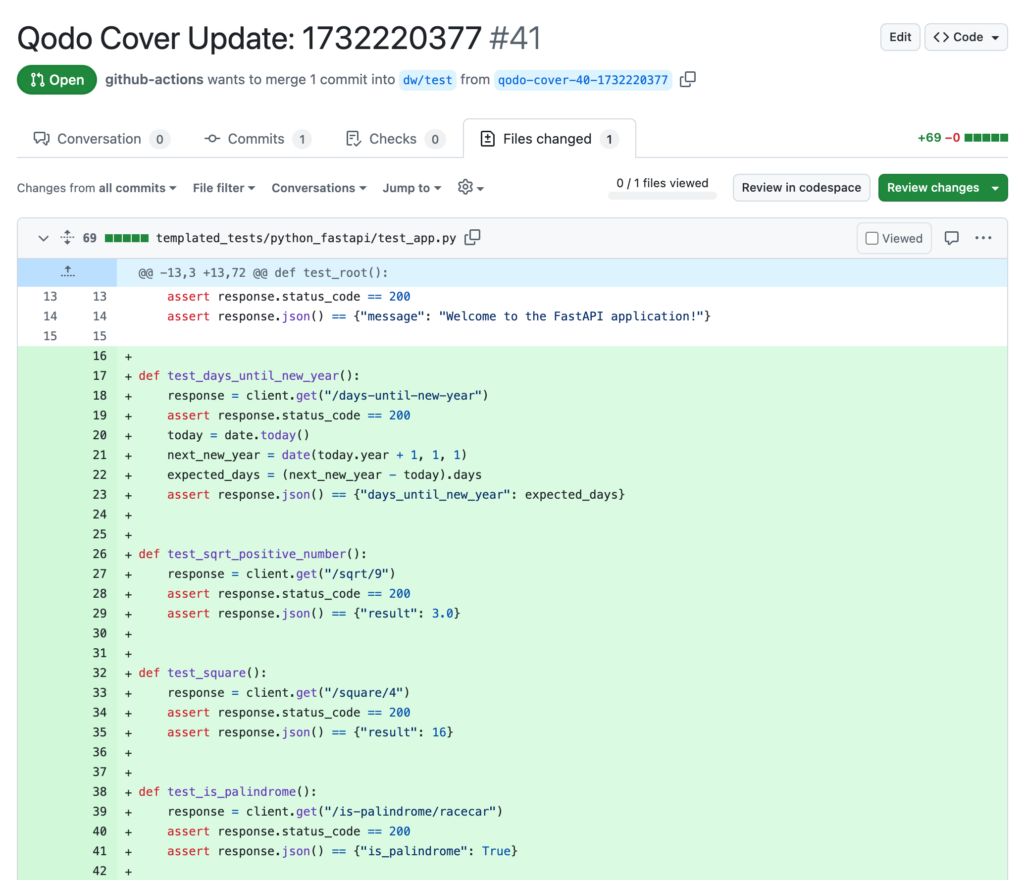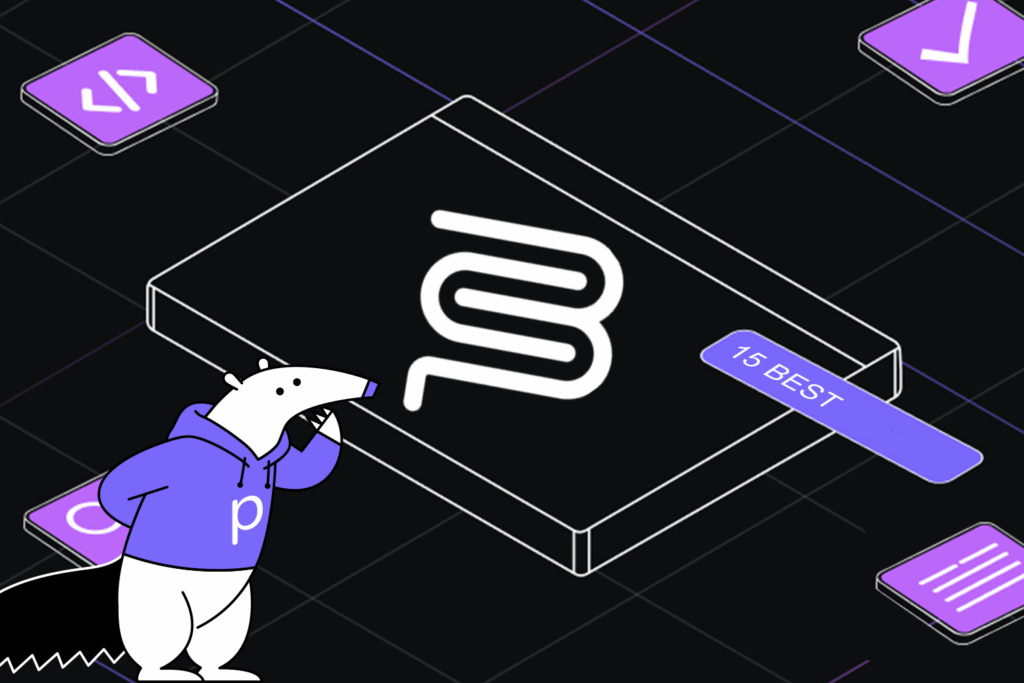Automate Test Coverage: Introducing Qodo Cover
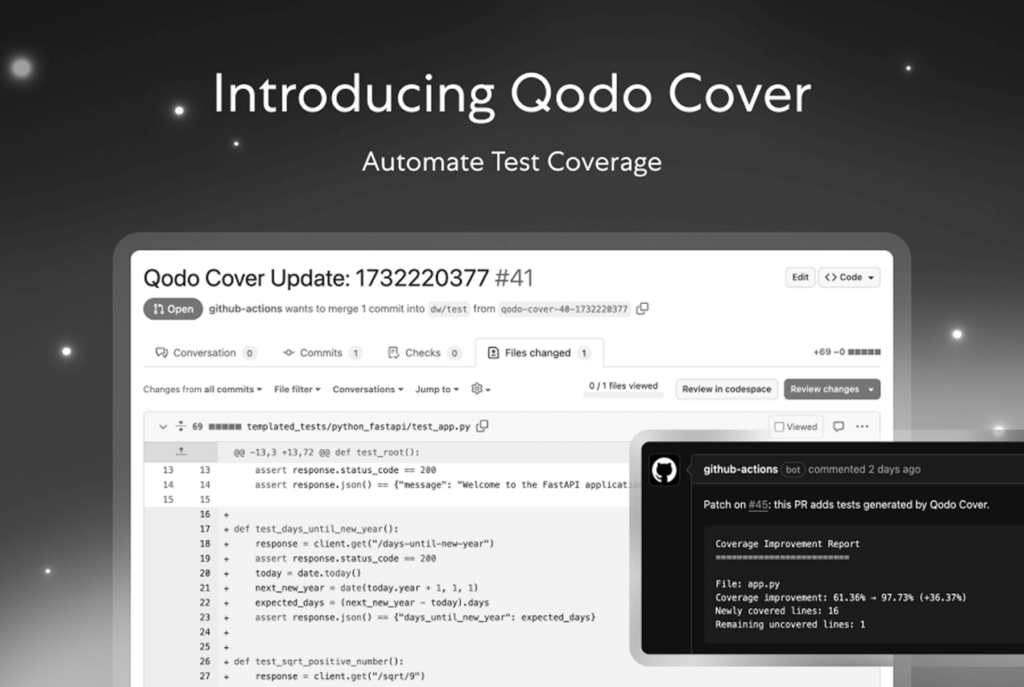

With AI-generated code becoming a cornerstone of modern software development—Google recently revealed that a staggering 25% of their new code is AI-generated—reliable code is more critical than ever. As AI takes on more coding tasks, the burden of ensuring code maintainability and reliability falls on processes like unit testing and regression testing—critical safeguards that verify functionality remains intact as code evolves.
Unfortunately, testing often takes a backseat in fast-paced development environments.
To help fill this gap, Qodo is excited to announce Qodo Cover, a new agent that automates test coverage for better code quality and efficiency.
What is Qodo Cover?
Qodo Cover is an agent that autonomously creates and comprehensively extends test suites using CLI or within the CI process. It generates tests by analyzing source code, then validates each test to ensure it runs successfully, passes, and increases code coverage in a meaningful way. With Qodo Cover, developers and teams can maintain consistent test practices, ensure comprehensive and efficient test suites, and keep them up to date.
Qodo Cover is currently in preview and is available for free for a limited time for Python projects, leveraging your own LLM API key from your favorite LLM provider.
Why meaningful test coverage matters
Meaningful test coverage is critical for maintaining the integrity, reliability, and maintainability of software systems, particularly in agile and fast-paced development environments. Test coverage refers to the extent to which the source code is exercised by automated tests, typically measured as a percentage of lines, branches, or paths executed during testing. However, high test coverage alone does not guarantee code quality—what matters is that the tests are well-designed, relevant, and capable of detecting potential issues. Poorly written tests, even at 100% coverage, can create a false sense of security while failing to catch edge cases, logical errors, or regressions.
Regression testing
Regression testing, in particular, plays a key role in ensuring that existing functionality remains unaffected by code changes. As software evolves, dependencies and interactions between components can introduce subtle bugs that are difficult to detect without comprehensive testing. Meaningful test coverage ensures that changes are validated against expected behavior and that all critical paths, edge cases, and exception scenarios are covered.
Why achieving high code coverage is a challenge
Achieving meaningful and high code coverage is inherently challenging due to the complexity of modern software and the time constraints faced by development teams. Codebases often contain a mix of legacy code, third-party libraries, and rapidly evolving features, making it difficult to ensure that all critical paths and edge cases are adequately tested.
Writing effective tests requires not just technical knowledge but also a deep understanding of application logic, expected behavior, and potential failure modes. This effort is compounded in large or distributed teams, where coding styles and priorities may vary, leading to inconsistencies in how tests are written and maintained. Moreover, tests must be both comprehensive and efficient; overly broad or redundant tests can slow down pipelines and create maintenance overhead, while insufficiently focused tests fail to provide meaningful coverage.
For AI-generated code, the challenge is even greater, as it may introduce unpredictable patterns that require meticulous validation to avoid regressions or missed defects. Balancing the need for high-quality tests with the realities of tight deadlines and limited resources makes achieving meaningful and high code coverage a non-trivial task.
How does Qodo Cover work?
Qodo Cover analyzes your existing test coverage and intelligently generates additional tests to improve coverage while ensuring high-quality, meaningful test cases. It’s designed to seamlessly integrate into development workflows, offering developers a practical and automated solution for enhancing test coverage.
Here’s how it works:
Integrated into CI workflows
Qodo Cover is installed as a Github Action and can also run via CLI. The GitHub action option is particularly powerful, as it allows teams to automatically enhance test coverage as part of their CI pipelines, supporting the following main use cases:
1. Running Qodo Cover to extend existing test suites throughout the repo, in order to increase overall test coverage.
2. Triggering Qodo Cover on a code change, to ensure the new code is properly tested with good coverage. Once Qodo Cover is added to your repository as a Github Action, it can be triggered in various scenarios: when a new PR is opened, on a scheduled basis, manually, etc.
Intelligent Context Awareness
Once triggered, Qodo Cover will scan your repo to analyze entire repositories. It identifies relevant test files and gathers contextual information about the code under test, allowing it to generate precise and meaningful tests tailored to the application’s unique requirements.
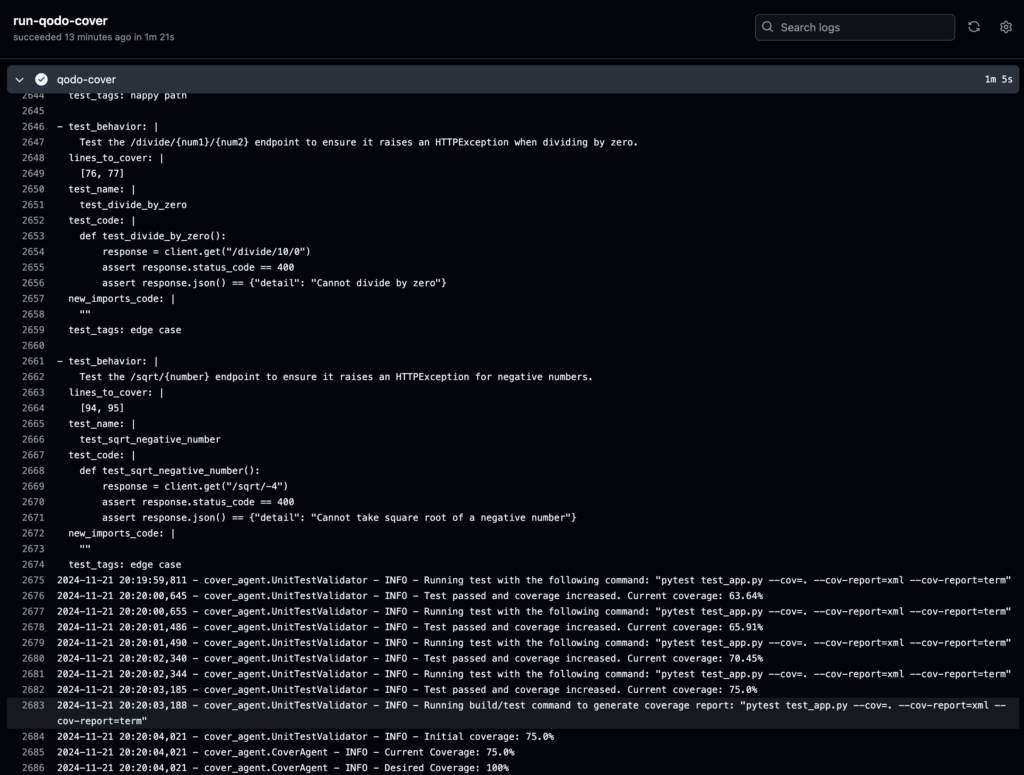
Extend Test Suites
Qodo Cover generates new, high-quality tests for your codebase and validates them to meet desired coverage goals and quality standards. These tests are designed to integrate smoothly into existing test suites, reducing the manual effort required to close coverage gaps and maintain high standards for reliability.
Code Analysis and Coverage Reports
Qodo Cover deep analysis of your code to pinpoint gaps in existing test coverage. It then ensures that every generated or augmented test adds meaningful value, avoiding redundant or unnecessary tests while improving overall code quality. Coverage reports provide insights for developers to track progress and understand the impact of new tests.
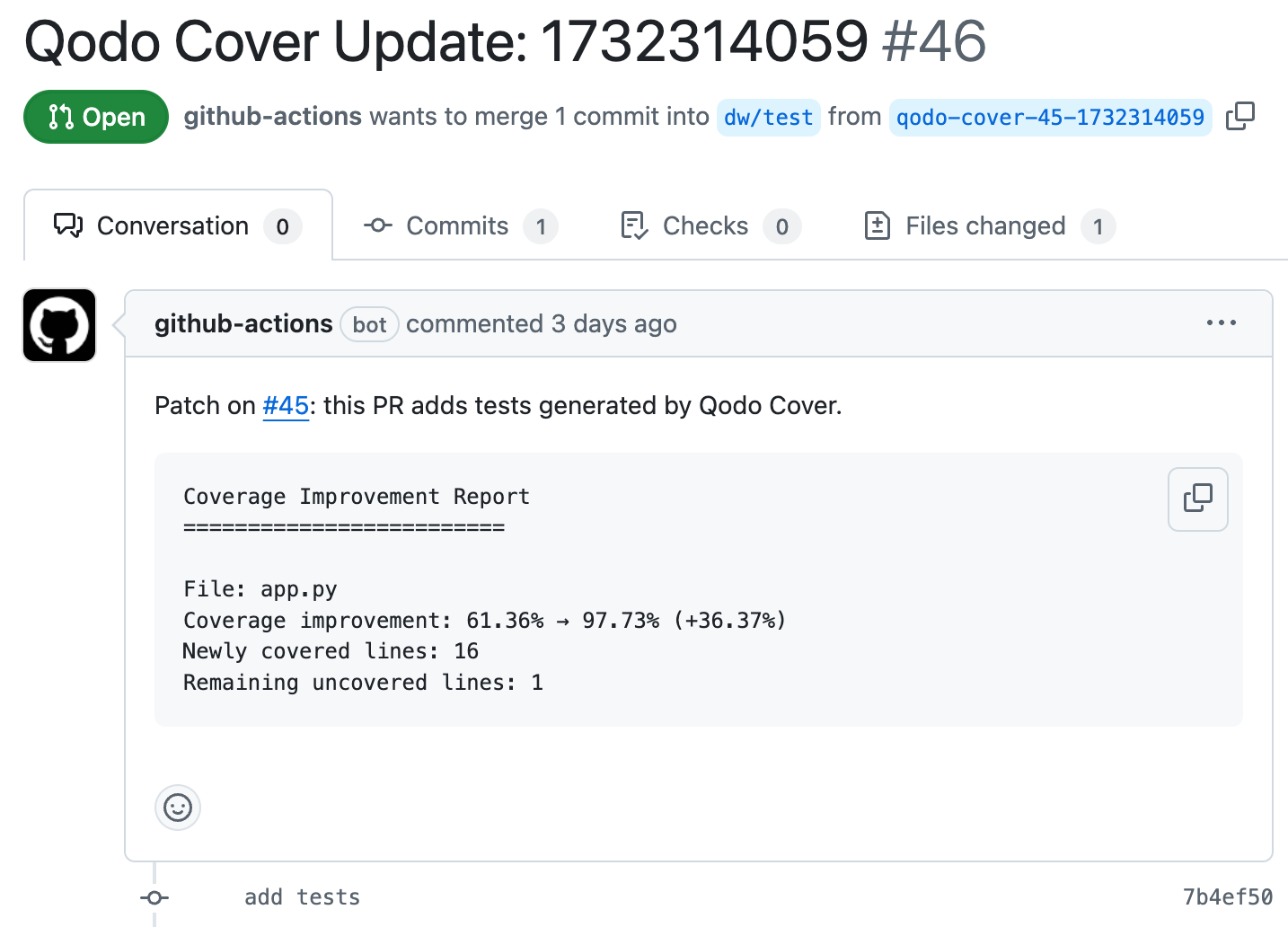
By automating these critical steps, Qodo Cover helps developers focus on delivering features while maintaining robust test coverage across their codebases. Developers maintain full control over the process, with the ability to review, edit, and selectively approve generated tests, ensuring alignment with project standards.
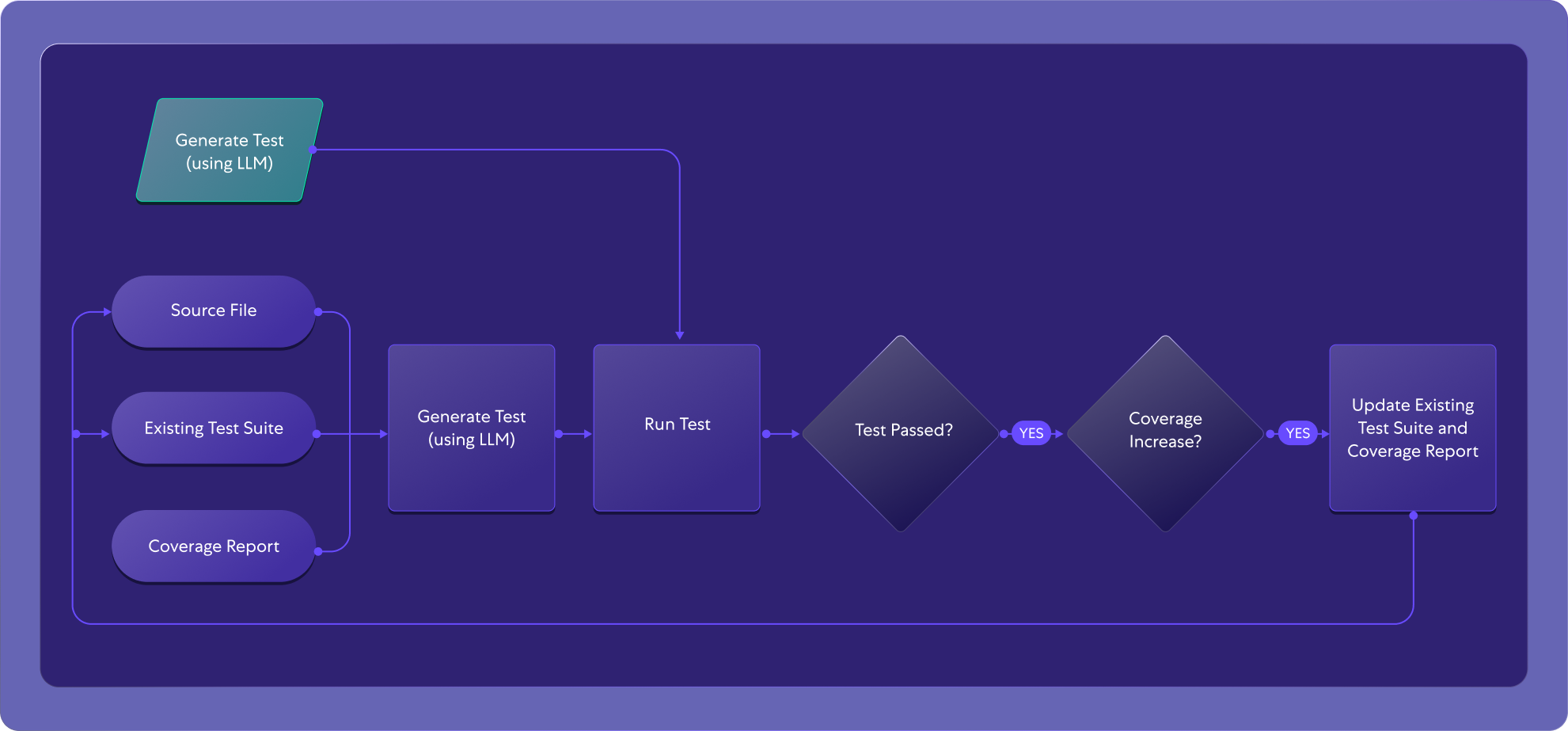
Qodo Cover in action
Qodo Cover is already starting to prove its capabilities in real-world scenarios. Notably, a pull request autonomously generated by Qodo Cover, featuring 15 high-quality unit tests, was accepted into Hugging Face’s PyTorch Image Models repository — a highly respected machine learning project with over 30K GitHub stars and used by 40K+ projects. Qodo Cover added tests covering 168 new lines of code.

The Qodo Cover team has also submitted PR’s to other notable projects, including facebook/prophet and microsoft/onnxscript.
Get Started with Qodo Cover
Qodo Cover is built on top of our open source project. It is currently in preview and is available for free for a limited time for Python projects, leveraging your own LLM API key from your favorite LLM provider. It’s a practical way to improve code quality and reliability. For more details, reach out to the Qodo team.

